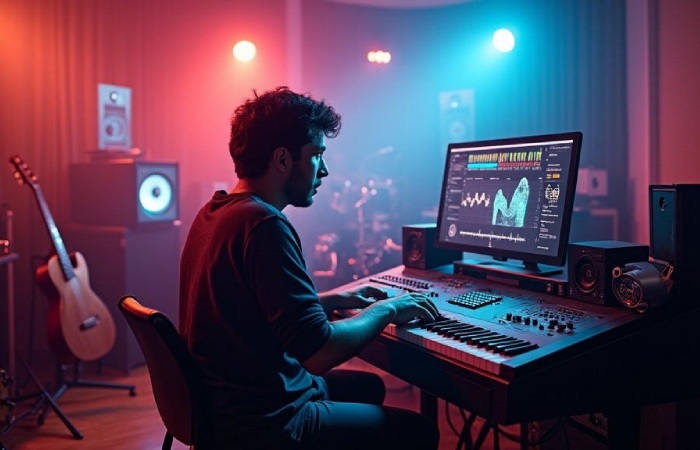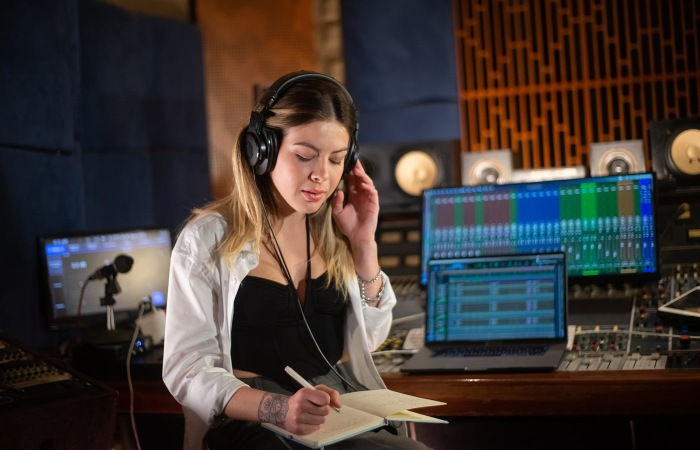Artificial intelligence (AI) is changing the technique by which we experience music in more ways than one Music Industry. From composing new tunes to predicting the next big hit, AI is making waves in the music industry.
Whether you’re an avid music listener or an unplanned fan, seeing how technology revolutionizes this field is exciting. Let’s look at some key areas where AI is making a significant impact.
Composing Music with AI Music Industry

Imagine a world where your favourite songs weren’t composed by people but by algorithms. Sounds like science fiction, right? Well, it’s already happening. AI-powered music composition tools use complex algorithms to create melodies, harmonies, and entire songs.
These tools analyze thousands of existing tracks to understand what makes them popular and then generate new music based on that data. For example, the platform can analyze pop songs to create a catchy new tune that will likely become a hit. This doesn’t mean that human songwriters will be out of a job. Instead, they can use these AI tools to enhance their creativity and create music more efficiently.
Personalized playlists Music Industry
Have you ever wondered how your music app knows exactly what you want to listen to? This is AI in action. By analyzing your listening habits, AI algorithms can create personalized playlists that match your mood and preferences. Whether you’re in the mood for something upbeat or more relaxed Music Industry, AI can find the perfect playlist.
It considers the time of day, your previous music-listening behaviour, and even the weather to suggest songs. This way, you spend less time searching for the music you want and more time enjoying it. It’s like having a personal DJ who knows you better than anyone else Music Industry.
Dynamic soundtracks in games.
AI is also making its mark in the world of video games. Dynamic soundtracks that change based on the player’s actions and the game’s environment add an extra layer of immersion. For example, in a match like Spinzinga Casino, the background music can change to a more intense beat as the high-stakes moment approaches. This adaptability makes the gaming experience more fun and realistic.
AI analyzes the events in the game and adjusts the music accordingly, ensuring that the soundtrack enhances the overall experience. It’s an exciting combination of technology and art that creates memorable moments for players Music Industry.
AI in Music Production

AI is also making a big splash in the music production process. Mixing and mastering a track is traditionally labour-intensive and highly skilled. AI tools can help improve audio quality and, ideally, mix tracks. These tools analyze and adjust the audio to ensure the best possible sound.
They can balance levels, reduce noise, and even suggest improvements. This doesn’t replace the need for experienced producers but makes the process faster and more efficient. With AI, even amateur musicians can create professional-quality tracks from the comfort of their homes.
Virtual Artists
Believe it or not, AI-generated artists are becoming a reality. These virtual artists are created using AI technology to make music and lyrics and even perform at virtual concerts. They don’t exist in the real world, but their music can be just as popular as human artists Music Industry.
Fans can interact with these virtual artists through social media and VR platforms. It’s a whole new way to experience music and entertainment. While this may seem like something new, it is gaining ground and could become a significant part of the music industry in the future. Imagine attending a concert where the performer is an avatar created by AI!
AI in Music Marketing
Marketing is another area where AI is having a huge impact. AI can predict music trends and audience preferences by analyzing data from social media, streaming services, and other platforms. This helps record labels and artists decide what music to produce and how to promote it Music Industry.
For example, if an AI algorithm spots a growing trend in a particular genre, artists can jump on board to benefit from it. Similarly, AI can help determine which songs will most likely become hits, allowing for more targeted marketing campaigns. It’s like having a crystal ball that can foresee future music trends.
Music Rights and Royalties

Managing music rights and royalties is complex, but AI makes it more accessible. Traditionally, keeping track of who gets paid for what can be a logistical nightmare, especially considering the global reach of digital music. AI can help by automating the process of tracking works and ensuring that artists and rights holders get their fair share Music Industry.
For example, AI can monitor streaming platforms to track how many times a song is played and automatically calculate royalties. This ensures that artists are relatively salaried for their work, reducing the likelihood of disputes and errors. This is a win for everyone involved in the music industry.

